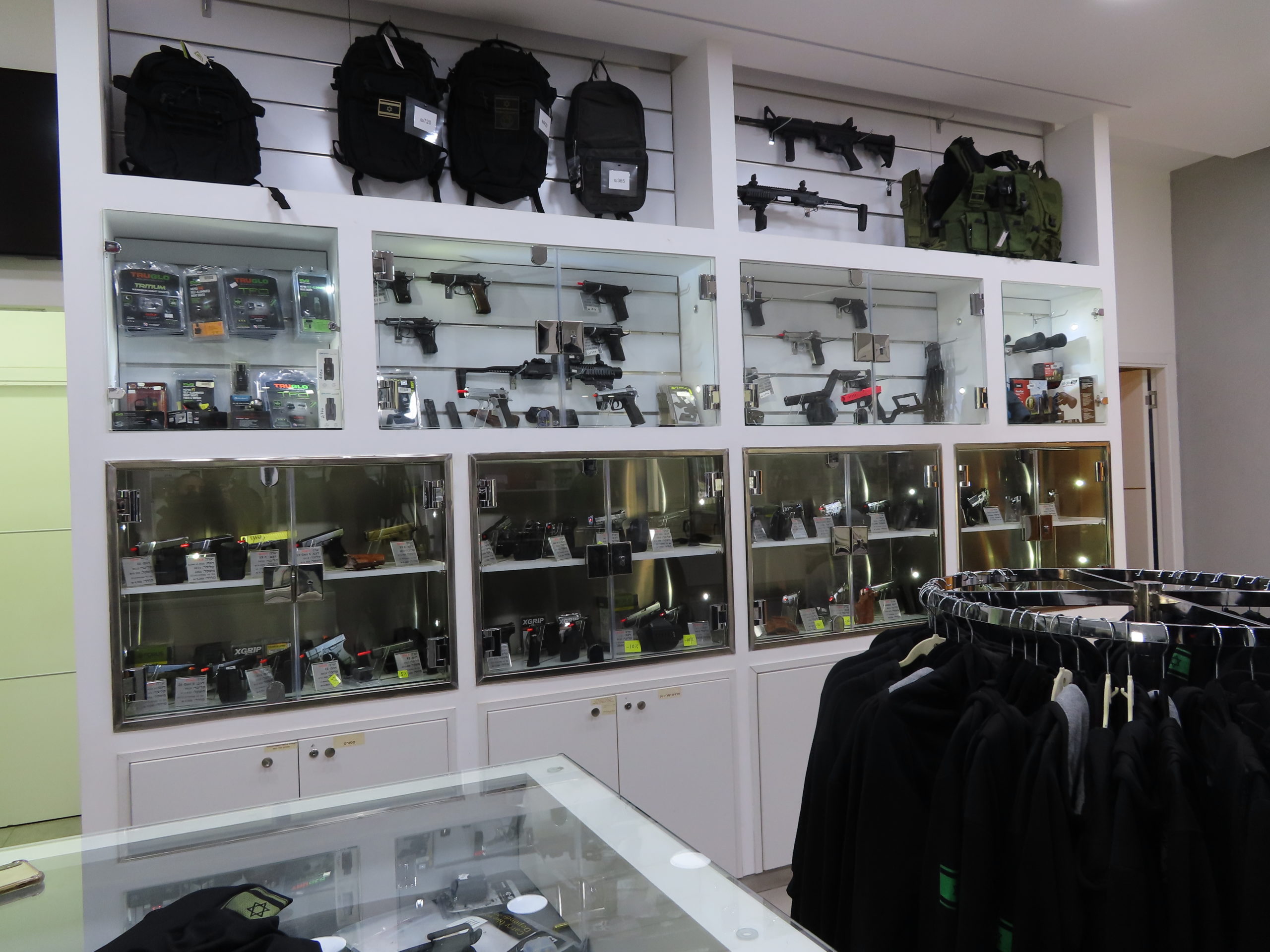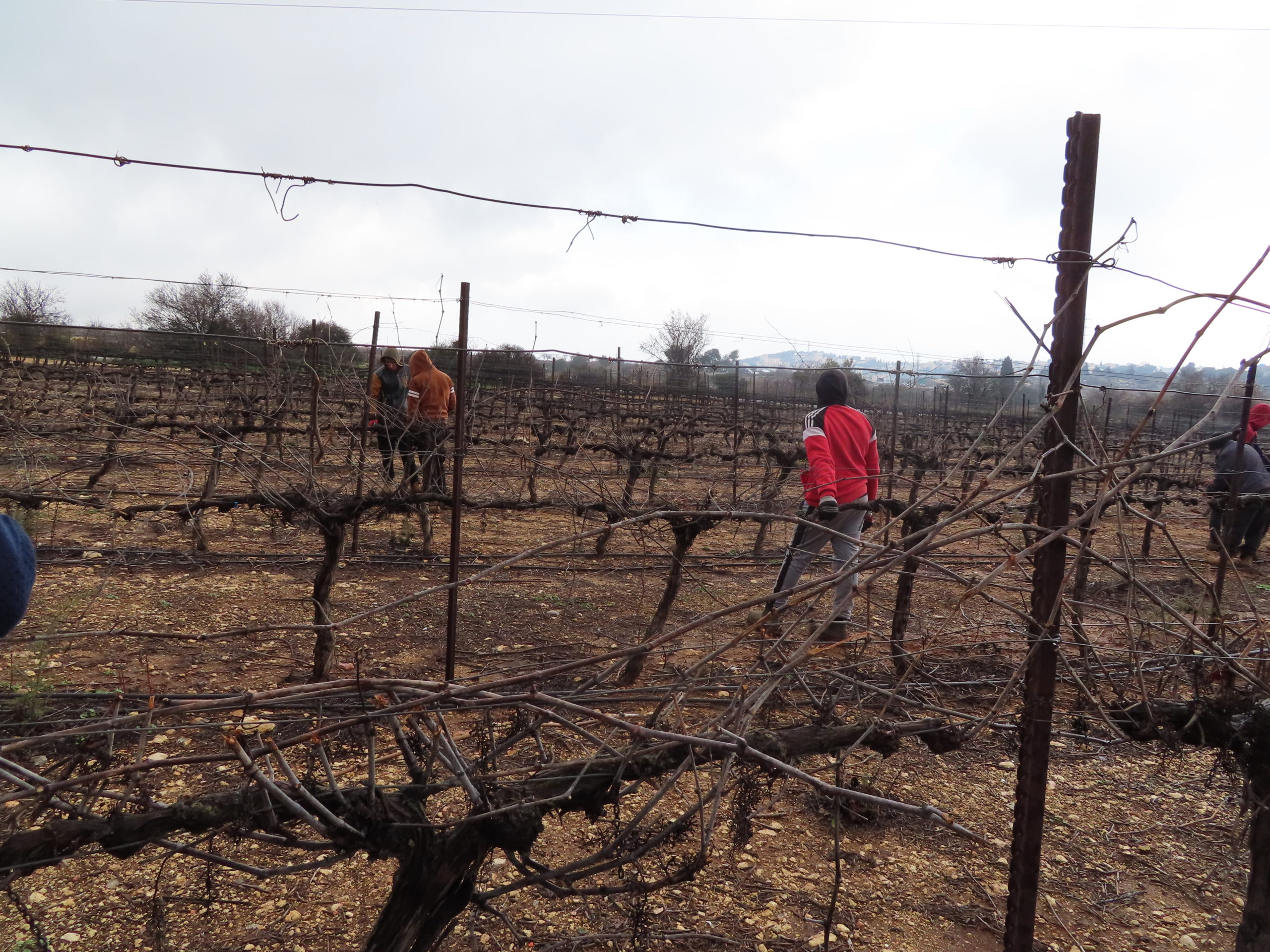While much of the world deems settlements a violation of international law, some Palestinians say they have no choice but to work in them
Walking down the desolate paths upon entering the grounds of Caliber 3 in the Gush Etzion region of the West Bank is somewhat inauspicious. The scene at first glance is one of a collection of seemingly crumbling infrastructure.
That is, until one reaches the company’s main office, where the front desk is decorated with weaponry: guns, ammo and, on the backdrop, are mannequins bedecked in full military gear. If human, they would likely be preparing to be deployed on a Special Forces mission.
Caliber 3 is an Israeli-owned counterterrorism and security academy that provides intensive self-defense training to customers from across the globe. It is one of 112 businesses included earlier this month on a controversial United Nations “blacklist” of companies in the West Bank that “raised particular human rights concerns.”

Weapons line the walls inside Caliber 3, an Israeli company located in the West Bank that provides self-defense training and was just placed on a “blacklist” produced by the UN Human Rights Council, February 19, 2020. (Dima Abumaria)
While the database is comprised primarily of Israeli- and Jewish-operated corporations, the UN Human Rights Council (UNHRC) identified numerous international firms as well, such as Airbnb, Expedia and TripAdvisor.
For years, the Israeli and United States governments had attempted to block the list’s publication, which, perhaps not coincidentally, came a day after a debate in the Security Council on US President Donald Trump’s Middle East peace plan. The proposal envisions Israel’s annexation of large swaths of the West Bank, which was captured from Jordan during the 1967 war but which the Palestinians claim in its entirety as part of a future state.
The list’s release also came just months after the Trump Administration reversed decades of US policy by rejecting the notion that Jewish settlements were inherently illegal, a position maintained by most world capitals.
Both Jerusalem and Washington feared that the list’s exposure would provide fuel to the boycott, divestment and sanctions (BDS) movement, proponents of which advocate cutting off political, economic and cultural ties with any entity maintaining a relationship with Israel. Some contend that BDS is inherently anti-Semitic, as its indirect call for a single state rather than two states means the dissolution of Israel and, by extension, an end to the Jewish people’s right to self-determination.
In response to the UN move, Israel’s Foreign Ministry announced it was ending cooperation with the High Commissioner for Human Rights, Michelle Bachelet, whose office compiled the list.
“Whoever boycotts us will be boycotted,” Prime Minister Binyamin Netanyahu asserted in reference to the UN initiative, even as he attempted to downplay its significance by describing it as “irrelevant.”
Sharon Gat, the CEO of Caliber 3, agrees with the sentiment.
“I do not have a clue why we were targeted by the UN, but I’ll tell you something: What we do here is to ensure that the most important thing for a human being exists. And what is that? Life,” Gat told The Media Line. “I don’t think there is anything bad about that. … On the contrary, if this is not positive, I’m not sure what is.”
Gat, whose company has branches throughout Israel and in the United States, expressed hope that the UN decision would have no bearing on the economy of Gush Etzion, an expansive area about 20 kilometers south of Jerusalem that is dotted with interwinding Israeli and Palestinian cities, towns and villages.
“I’m going to continue doing my thing, and this list, God willing, should not have a negative influence on those who are trying to make life better for the people,” Gat said.
He explained that Caliber 3 does not have Palestinian clients because they lack Israeli citizenship and therefore cannot receive the necessary documentation to partake in its programs.
“But, theoretically,” Gat concluded, “if they had a permit to carry a weapon, they could learn with us like any other person.”
For its part, the Palestinian Authority welcomed the release of the UNHRC “blacklist” and vowed to use all the tools at its disposal to force businesses to discontinue their dealings with Israelis beyond the Green Line.
Mustafa Barghouti, secretary-general of the Palestinian National Initiative, a political party, told The Media Line that the PA had “been asking for this list to be released for over three years. It is a very good move,” he said, “as it discloses companies that are in the illegal Israeli settlements.”
Barghouti predicts that many “ethical investors will now withdraw their funds from these firms, which will destabilize them and compel them to understand that they cannot continue.”
And regarding the Palestinians working therein, Barghouti denounced “collaboration with an occupier” as something unacceptable.
“The [Palestinians] who work in settlements,” he contended, “will find better job opportunities if we enhance the boycott campaign [against Israel] because this will increase our internal production.”
He noted the 60% unemployment rate among Palestinian youth.
“The solution is not to work in settlements but to end the occupation,” Barghouti said, while conceding that the PA needed to overhaul its finances in order to allocate more funds toward creating more jobs.
In the interim, some estimates peg the number of Palestinians working in settlements at 35,000. Overall, some 100,000 are believed to derive their livelihoods, both legally and illegally, from within Israel proper or from Jewish-run commercial entities in the West Bank.
One such place is the Gush Etzion Winery, where Palestinian employees were braving the rain while tending to the vineyards. The two workers who spoke to The Media Line on condition of anonymity insisted that they had few other viable work options.

Palestinians work in the vineyards at the Gush Etzion Winery, which produces about 100,000 bottles per year in the West Bank, February 19, 2020. (Dima Abumaria)
“The PA should be providing us with jobs, and maybe it will, but I earn two to three times as much here as I would if I was [doing the same thing in PA-controlled territory],” a middle-aged laborer revealed. “There are a lot of us, and we have become accustomed to being in settlements.”
Assaf Rozenberg manages the family-owned winery, which manufactures about 100,000 bottles each year. He suggested that the UN’s blacklist was the natural extension of the European Union’s push to prevent goods manufactured by Jewish businesses in the West Bank from being labeled “Made in Israel.”
“Everyone can make their own decisions about what products they purchase,” Rozenberg told The Media Line, “but if communities choose not to buy our wine and the company loses money, we are not losing alone. All of the people here lose together.”
In this respect, Rozenberg stressed that his business was only one cog in an interconnected economic ecosystem, one in which “you can’t punish certain elements without punishing the others.”
A case in point is the Rami Levy supermarket, which has a store in Gush Etzion’s largest mall. Despite the grocery chain’s well-known commitment to having Palestinians on the payroll, it was also named in the UNHRC database.
Moshe Bruce, who oversees tourism in Gush Etzion, suggests that many opponents of the settlements lack a fundamental understanding of the complexity of the conflict, which, in turn, unfairly places institutions like Rami Levy in the crosshairs.
“I feel bad for these people as, in the end, I believe they have good intentions,” Bruce stated during a visit to the mall. “But it is very strange that those on the outside who are unaware of how people interact here – the combination of Jews and Arabs – are trying to change the situation.”
The calmness and familiarity with which consumers intermingle in the commercial space could easily make one forget about the reciprocal political animosity apparently shared by the governments in Jerusalem and Ramallah. Indeed, in Bruce’s estimation, the mall is a microcosm of the actual reality: that is, of two peoples still technically at conflict but who in many important ways have learned to live together in one land.
“This is where Jews and Arabs come to shop, to buy food and clothing. Everyone has the same basic needs and are seeking a good quality of life. They come here to do this – it is our little place of peace,” Bruce said.
Aharoni Neubauer, CEO of the Gush Etzion Development Company, told The Media Line that whereas things remain “business as usual,” international pressure has, to a degree, made it difficult for the municipality to expand.
“We are still growing, but some companies are a little bit afraid. It is ridiculous because BDS is hurting the Palestinians more than the Jews. This is because Palestinians who work here earn a much higher salary, so the fewer opportunities there are for them, the more damage it causes,” he said.
“In truth,” added Neubauer, “people who see products that are labeled as manufactured by Israelis in the West Bank need to go out and buy them because doing so makes the Palestinian Authority’s economy stronger.”
Ammar Hijazi, the PA’s assistant minister for multilateral affairs, vehemently disagrees. He opposes any activities that contribute to the entrenchment of any Israelis in the West Bank.
“Actions that support, maintain or are complicit in [prolonging the existence of settlements] are illegal and should be ceased,” he told The Media Line in Ramallah. “The settlements exploit our natural resources and deny us the opportunity to use our land. As such, we cannot accept this notion.”
Finally, there is the UN’s shining of a spotlight on only one side of one of so many conflicts raging worldwide, a scenario Shlomo Naaman, head of the Gush Etzion Regional Council, argues is hypocritical.
“The idea of equality, that all people have rights, that we are all part of [one global humanity], is a norm that is applied to everywhere except for [Jewish communities in the West Bank],” Naaman told The Media Line during a meeting at his office. “People who think that singling out [Jews] will somehow benefit Arabs are hurting first and foremost those [they are ostensibly aiming to help].”
In this vein, Naaman implied that the PA was also doing a disservice to its population by opposing “normalization” with Israel.
“For Jews, there are places to go. Not so for Arabs, who by working here get more money, receive pensions and health care. … They have this only with us … and not even in their autonomous territories,” he elaborated.
“Jews and Arabs residing together, working together, talking together,” he said. “We are here together.”
Dima Abumaria, The Media Line’s Arab affairs correspondent, contributed reporting from Ramallah.